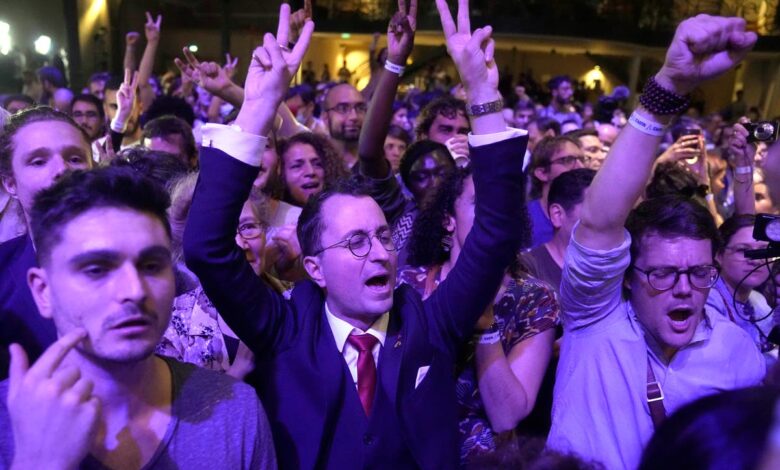France’s Macron loses parliamentary majority as left and right surge

France’s far right and a coalition of leftwing parties surged while President Emmanuel Macron lost his coveted majority in the parliamentary elections that could shape the country’s politics for years to come.
Early projections by several polling firms predicted Mr Macron’s Le Republique en Marche would win only about 230 seats, besting all other parties and coalitions but a far cry from the 289 needed for an absolute majority and far less than the 350 seats his centrist political brand won and drew into its camp in 2017.
The New Ecologic and Social People’s Union, a hastily cobbled together coalition of leftist, far-left and green political parties cobbled together by Jean-Luc Melenchon, came in second place with a projected 149 seats. The fiery Melenchon was triumphant, lashing out at Mr Macron.
“It is a totally unexpected situation, absolutely unheard of, the rout of the presidential party is total,” he said after the results began coming in. “They wanted to avoid defeat at the cost of dishonour. Tonight they have both defeat and dishonour.”
But it was the far-right Marine Le Pen’s National Rally party that surged the most in the election, winning around 85 seats or 15 per cent of the 577-seat national assembly, a dramatic turn of fortunes from 2017, when she managed to win only eight seats. The performance was the best for the French far right movement founded by Le Pen’s father Jean-Marie since it was founded four decades ago.
“The number for the National Rally is something that no one saw coming,” Lea Chamboncel, a French political journalist and podcaster, said in an interview. “It’s a bad surprise,a very bad surprise.”
The traditional centre-right came in fourth place winning a projected 76 seats, down from 130 in 2017. Final numbers were still being tallied by the minister of interior.
Sunday’s parliamentary election may have little direct or immediate impact beyond France. Mr Macron defeated Ms Le Pen to win a second five-year term in April. Matters of foreign policy, national security and European affairs remain deeply enshrined within the purview of the presidency, with parliament playing far less of a role than it does in other western democracies.
But to woo independent lawmakers in other camps and cobble together a majority on domestic matters, Mr Macron may have to give way on hot-button issues that do have an impact abroad, such as military support for Ukraine, trade negotiations with the United Kingdom or expansion of the European Union.
Though French voters of the left and right banded together to vote for Mr Macron to defeat Ms Le Pen in April, the elections Sunday carried some unsettling messages for the president and his centrist allies.
“It’s far from what we hoped for,” the minister of public accounts Gabriel Attal said in an interview with BFMTV.
Among those who lost their seats was Amelie de Montchalin, Mr Macron’s minister of ecological transition, who was defeated by the leftist Jerome Guedj in Essonne, a constituency 30 miles south of Paris. Christophe Castaner, a former interior minister under Mr Macron, was also beaten by a leftist candidate.
“Voters are unhappy with Macron, that’s for sure,” said Ms Chamboncel, author of a book calling for more women in politics. “It was a midterm election for him and he lost.”
Mr Melenchon managed revive the fortunes of the long-moribund French left to draw a new generation of young voters and candidates into the arena—many of them women and from marginalised immigrant backgrounds. But despite glee over Mr Macron’s performance, the left also faced some sobering moments. Fabian Rousel, a prominent leftist, barely squeaked out a victory against a far right candidate in a northern constituency along the Belgian border.
Ms Le Pen reinvented her father’s political movement to make it more palatable to the centre right voters. But it remains staunchly anti-immigrant and anti-European Union. It is also financially beholden to banks linked to the Kremlin.
The size of Ms Le Pen’s parliamentary bloc crosses a number of legislative hurdles that will allow her to introduce, for example, censure measures and bring up matters before the constitutional court.
Ms Le Pen, beaming with joy among a crowd of supporters after winning her seat in the second round, promised changes.
“The new faces you are about to discover are the vanguard of this political elite who will take responsibility for the country when the Macron adventure comes to an end,” she said to cheers and applause. “We are going to continue the work of bringing the French people together into a great popular movement.”
Journalists and supporters look at Marine Le Pen delivering a speech on TV after the results of the second round of the French legislatives elections





